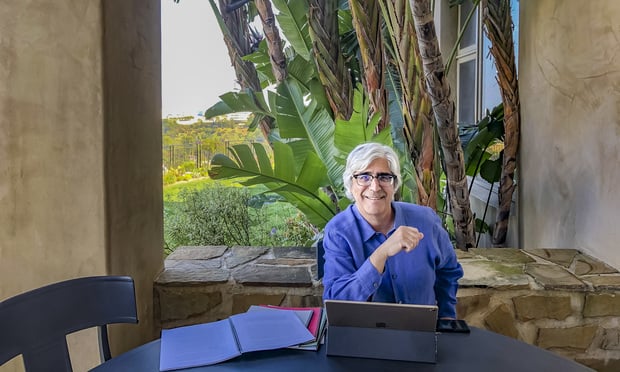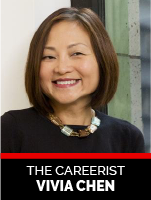From the COVID-19 Bunker: Ted Boutrous on His Anti-Trump Tweets, Poetry and Hair
This is the third installment in The Careerist's series on how legal luminaries are dealing with the pandemic.
April 22, 2020 at 05:35 PM
6 minute read
The original version of this story was published on The American Lawyer
 Theodore Boutrous Jr. at home in Brentwood (courtesy photo)
Theodore Boutrous Jr. at home in Brentwood (courtesy photo)
This is the third installment of my series "From the COVID-19 Bunker" on how legal luminaries are dealing with the pandemic.
 Today I'm talking with famed litigator Theodore Boutrous Jr., global co-chairman of Gibson, Dunn & Crutcher's litigation group. You undoubtedly already know Boutrous—if not for his celebrated history (more than 100 appellate arguments) and roster of impressive clients (Walmart, Apple, Chevron, Ashley Judd), then for his outsized presence on Twitter (37.3K followers!) and his robust mane of white hair.
Today I'm talking with famed litigator Theodore Boutrous Jr., global co-chairman of Gibson, Dunn & Crutcher's litigation group. You undoubtedly already know Boutrous—if not for his celebrated history (more than 100 appellate arguments) and roster of impressive clients (Walmart, Apple, Chevron, Ashley Judd), then for his outsized presence on Twitter (37.3K followers!) and his robust mane of white hair.
Below is an edited version of our phone chat and email exchanges.
Where are you? My wife Helen [a professor at Mount St. Mary's University in Los Angeles] and I are in Brentwood. We've been here for the last five weeks.
So how's the adjustment to litigating from the home front? The work for litigation has kicked back in. I had eight arguments that were put off that are now rescheduled.
I also did an argument before the D.C. Circuit for [Playboy reporter] Brian Karem—that was the first time I argued an appeal by phone. We are in a battle about access to daily press briefings at the White House. I was surprised the Justice Department appealed [after the district court restored Karem's press credentials] and took an extreme position on the First Amendment—that the White House can discriminate and bar reporters they don't like.
You've clashed with the administration's previous White House press secretaries—Sarah Huckabee Sanders on CNN's Jim Acosta, then Stephanie Grisham on Karem. You basically called Grisham unqualified. But now we have a Harvard Law grad—Kayleigh McEnany—as press secretary! Are you hopeful that McEnany will bring professionalism to the job? From what I saw of her even before her taking the job, she seems willing to say anything to defend Trump, so I'm not optimistic. She hasn't taken the podium—and Grisham never did either; they're not doing their jobs. That's really dangerous.
Is it my imagination or are you tweeting more than ever about the Trump administration during this pandemic? I haven't measured my pacing. I regard Twitter as a source to keep up with the news. It's social; it's a way to keep ourselves entertained. I find the interactions interesting. Sometimes I wonder what psychologists, anthropologists and sociologists will think about Twitter. It's an archive of pain and laughter, and what the president tweets is fascinating but scary.
Is the Trump presidency galvanizing you to be more outspoken than ever? President Trump really did galvanize and cause me to speak out more frequently because of his sustained attack on the rule of law in this country. This has included demeaning and undermining the federal judiciary and the role of lawyers, attacking freedom of speech and of the press and running a disinformation campaign from the White House intended to confuse the American citizenry. I felt it was important to speak out as a lawyer and a citizen, and I believe it's a battle that truly transcends politics.
I know lawyers who can't stomach Trump, but they're much more cautious about revealing their politics. Do you think some of your partners wish that you'd zip it? Not everyone agrees with everything I am saying, but I think there is widespread recognition that we are living through extraordinary times and that there is real value to a full and wide open debate about such fundamental issues concerning our democracy. Our firm is a big tent that favors free speech, with lawyers from across the political spectrum, and we encourage our lawyers to participate in civic affairs, including political activities, in their individual capacities.
This is a question I've always wanted to ask: You're a liberal, yet you often advocate for big business on matters that prevent the little guy from getting justice. I'm thinking of your big win in the Dukes case in which the Supreme Court thwarted a class action for discrimination against Walmart. How do you reconcile those opposing interests? That's easy. To me, practicing law and practicing politics are entirely separate enterprises. In my legal practice, I focus on the facts and the law and zealously represent my clients. Even cases that involve suing the president—like the White House press pass cases and the DACA case—are not based on politics or political considerations, but rather the rule of law and the Constitution.
While I am a Democrat, I think that corporations and businesses are vital to our democracy and can be positive change agents in society, so I object when Democrats and progressives reflexively attack companies, and I think it's bad politics, too. Democrats should engage more affirmatively with the business community, instead of treating it like the opposition.
My role is to be part of the process. Does that mean I take every case? No. There are some cases that I don't want to participate in.
Has this pandemic changed your outlook about lawyering? I've been thinking more broadly about our Constitution—the good parts but also the flaws. I think we should start from scratch. I read Jill Lepore's book "These Truths" that looks at the deeply flawed roots of our country and how the Constitution grew out of that. I'm seeing how government can't deal with this pandemic, and it's partly because of the structural flaws in our system.
What else are you reading or doing to keep yourself sane and amused? I'm revisiting movies and creating our own movie festivals—one on Rob Reiner movies, one on Hollywood and one on journalism. I'm also going back to classics like "The Plague." I'm also reading poetry—confessional poets. I'm big on Sylvia Plath, Anne Sexton, Robert Lowell.
Wait. Ted Boutrous reads poetry? Sylvia Plath, no less? Who would have guessed? Who would have?
Finally, I'd be remiss if I didn't ask you about your hair, which is an indelible part of your brand. During this pandemic, what are you going to do to keep it nicely coiffed? I am going to go as long as I can with the hair and have now hit college-freshman length. But at some point self-help may become necessary.
Other posts in the series: 3M's Ivan Fong; Sullivan & Cromwell's Frank Aquila
Contact Vivia Chen at [email protected]. On Twitter: @lawcareerist.
This content has been archived. It is available through our partners, LexisNexis® and Bloomberg Law.
To view this content, please continue to their sites.
Not a Lexis Subscriber?
Subscribe Now
Not a Bloomberg Law Subscriber?
Subscribe Now
NOT FOR REPRINT
© 2025 ALM Global, LLC, All Rights Reserved. Request academic re-use from www.copyright.com. All other uses, submit a request to [email protected]. For more information visit Asset & Logo Licensing.
You Might Like
View All
What Qualities Will Distinguish Good from Great Service In 2025?

Law Firms Mentioned
Trending Stories
- 1'It's Not Going to Be Pretty': PayPal, Capital One Face Novel Class Actions Over 'Poaching' Commissions Owed Influencers
- 211th Circuit Rejects Trump's Emergency Request as DOJ Prepares to Release Special Counsel's Final Report
- 3Supreme Court Takes Up Challenge to ACA Task Force
- 4'Tragedy of Unspeakable Proportions:' Could Edison, DWP, Face Lawsuits Over LA Wildfires?
- 5Meta Pulls Plug on DEI Programs
Who Got The Work
Michael G. Bongiorno, Andrew Scott Dulberg and Elizabeth E. Driscoll from Wilmer Cutler Pickering Hale and Dorr have stepped in to represent Symbotic Inc., an A.I.-enabled technology platform that focuses on increasing supply chain efficiency, and other defendants in a pending shareholder derivative lawsuit. The case, filed Oct. 2 in Massachusetts District Court by the Brown Law Firm on behalf of Stephen Austen, accuses certain officers and directors of misleading investors in regard to Symbotic's potential for margin growth by failing to disclose that the company was not equipped to timely deploy its systems or manage expenses through project delays. The case, assigned to U.S. District Judge Nathaniel M. Gorton, is 1:24-cv-12522, Austen v. Cohen et al.
Who Got The Work
Edmund Polubinski and Marie Killmond of Davis Polk & Wardwell have entered appearances for data platform software development company MongoDB and other defendants in a pending shareholder derivative lawsuit. The action, filed Oct. 7 in New York Southern District Court by the Brown Law Firm, accuses the company's directors and/or officers of falsely expressing confidence in the company’s restructuring of its sales incentive plan and downplaying the severity of decreases in its upfront commitments. The case is 1:24-cv-07594, Roy v. Ittycheria et al.
Who Got The Work
Amy O. Bruchs and Kurt F. Ellison of Michael Best & Friedrich have entered appearances for Epic Systems Corp. in a pending employment discrimination lawsuit. The suit was filed Sept. 7 in Wisconsin Western District Court by Levine Eisberner LLC and Siri & Glimstad on behalf of a project manager who claims that he was wrongfully terminated after applying for a religious exemption to the defendant's COVID-19 vaccine mandate. The case, assigned to U.S. Magistrate Judge Anita Marie Boor, is 3:24-cv-00630, Secker, Nathan v. Epic Systems Corporation.
Who Got The Work
David X. Sullivan, Thomas J. Finn and Gregory A. Hall from McCarter & English have entered appearances for Sunrun Installation Services in a pending civil rights lawsuit. The complaint was filed Sept. 4 in Connecticut District Court by attorney Robert M. Berke on behalf of former employee George Edward Steins, who was arrested and charged with employing an unregistered home improvement salesperson. The complaint alleges that had Sunrun informed the Connecticut Department of Consumer Protection that the plaintiff's employment had ended in 2017 and that he no longer held Sunrun's home improvement contractor license, he would not have been hit with charges, which were dismissed in May 2024. The case, assigned to U.S. District Judge Jeffrey A. Meyer, is 3:24-cv-01423, Steins v. Sunrun, Inc. et al.
Who Got The Work
Greenberg Traurig shareholder Joshua L. Raskin has entered an appearance for boohoo.com UK Ltd. in a pending patent infringement lawsuit. The suit, filed Sept. 3 in Texas Eastern District Court by Rozier Hardt McDonough on behalf of Alto Dynamics, asserts five patents related to an online shopping platform. The case, assigned to U.S. District Judge Rodney Gilstrap, is 2:24-cv-00719, Alto Dynamics, LLC v. boohoo.com UK Limited.
Featured Firms
Law Offices of Gary Martin Hays & Associates, P.C.
(470) 294-1674
Law Offices of Mark E. Salomone
(857) 444-6468
Smith & Hassler
(713) 739-1250










